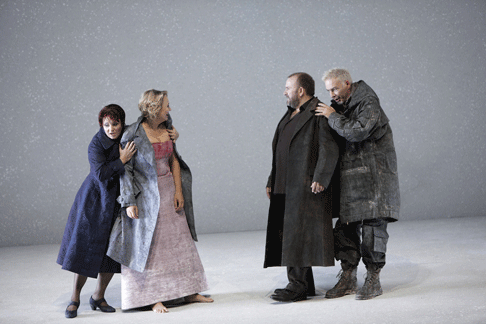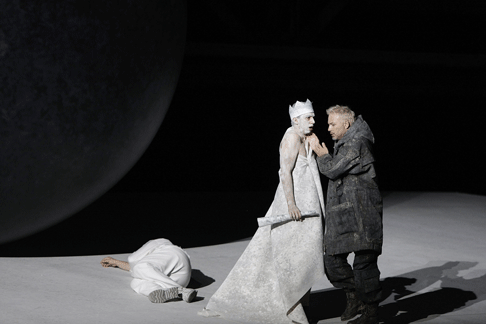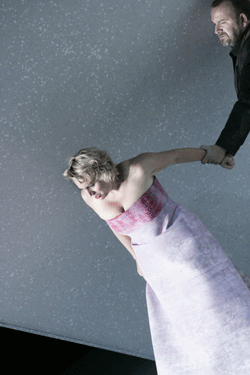But that was before we were regaled by the consummate artistry of director
Willy Decker, conductor Kirill Petrenko, and a team of visionary designers who
have crafted an austere, spare, uncommonly affecting work of art that virtually
defines Gesamtkunstwerk. If reassurance is needed (and I fear it is,
oh how it is) that a gifted creative team can not only brilliantly innovate,
but also genuinely serve the composer’s intent, this production was proof
positive. I am not sure the last time I was so captivated by a creation of
modern art, as I was taken by the massive and utterly simple set design by
Wolfgang Gussmann.
In front of the warehouse’s black, bare back wall, Mr. Gussmann has given
us two massive white trapezoids (sails?), one as floor and one as ceiling, that
narrow in perspective from front to back, gaping open towards us like a yawning
room. Upstage, a pure white sphere is the other constant element. These
components are perfectly tracked, flown, and hydraulically outfitted to twist,
turn and reconfigure in a seemingly endless re-arrangement to spectacular
effect. And the motion is often so subtle as to be undetectable until — what
the heck? — whoa! — the front corner of the stage right has quietly risen
twelve feet in the air tilting the whole dang playing space! As the huge floor
spun counter-clockwise over the pit at one point, I did fear for the
harpist’s safety (or at least the harp’s)!
The coup de théâtre of this production had to have been the
flawlessly stunning video projections by fettFilm’s (sic) Momme Hinrichs and
Torge Moller. At key moments the sphere was almost undetectably replaced by a
round white screen. The Love Duet’s churning-seas-imagery gave way to a
floating, nubile, nude couple who literally tumbled into and through each other
variously and repeatedly, a magical mirror of the lovers’ emotional
intertwining, and a perfect visual partner to the sinuously sensual musical
effects. When Tristan pours out his afflicted feelings in Three, a series of
images of a young man trapped behind a wall of fabric provides a devastating
counterpoint to our hero’s anguish at being unable to escape his fate. Time
and again the young man desperately pushes forward against the stretching,
unyielding fabric. I usually run the other way from installation video art in
museums, but these images were not the usual self-indulgent filmography, but
true works of beauty in their own right, that also greatly supported Wagner’s
composition.
I hasten to add that Andreas Grüter’s fluid, moody lighting design was a
perfect artistic collaboration. At the very end of the rapturous duet, this
team suddenly cross-faded the general wash on the structure and replaced it
with a stage-encompassing video projection like the Milky Way. And then, as we
made the jump to light speed and the stars began to recede, the two imposing
trapezoids seemed to lift and float (all through projections), and spun and
receded through the atmosphere like the monolith in 2001, A Space
Odyssey. The goose bumps are returning as I recall this as one of the
finest theatrical effects in a lifetime of opera-going.

Gussmann collaborated with Susana Mendoza to provide the handsome modern
costumes. They treated the characters as contemporary archetypes and it worked
well enough, especially for Isolde who appeared to good advantage in a light
dusty rose strapless gown with a wrap around ‘ribbon’ of fuschia accenting
the bosom. That she was barefoot effortlessly communicated her captivity.
Tristan appears first in hip black clubbing garb down to the calf-length
trenchcoat. The pair both tellingly change to all-white versions of their
clothing for their Act Two encounter. Kurwenal sports a happenin’, dark gray
Land’s End ensemble, and Melot is suited up like a pimp. Brangäne’s
tailored business outfit was a wonderful contrast to Isolde’s chic look. Only
the shepherd was puzzling, with his paper-crown-and-cape outfit looking more
like the Fool in King Lear than a simple bucolic lad. I also must
point out that the choices of richly textured, detailed fabrics ‘read’
extremely well in the house.
Willy Decker has crafted a straight forward and character-driven approach to
the blocking, which is almost choreographed. Mr. Decker uses the changing
levels of the floor to underline the dominant character in several encounters.
He uses every inch of the playing space with visual variety and dramatic
purpose. For Act Two’s garden, he chooses to begin the scene with Isolde
trapped next to Marke, as they sit in rows of chairs amid the chorus, as if
spectators at a stuffy state function. As the crowd disperses, some meaningful
business was provided as Brangäne cleared the stray seats, to make way for the
tryst. Luckily, Herr Decker had a willing and talented cast at his disposal to
further his conception.
Anja Kampe scored a triumph as Isolde. I first heard her as a very good
Sieglinde at Washington Opera, with a gleaming jugendlich-dramatisch soprano of
good promise. Well, that promise has been amply fulfilled. She has most
assuredly got Isolde ‘in her voice’; that is, she has negotiated her
considerably sized, warmly appealing instrument to successfully encompass the
myriad demands of the Irish Princess. She has the requisite power, to be sure,
but Ms. Kampe also has such a secure, lyrical, personal approach to so much of
the role that she now joins the rarefied ranks of “Isolde of Choice.” And
Anja is a sincere actress, lovely and unaffected, with a full understanding of
Isolde’s journey. The cascades of cheers that met her curtain call were
deservedly the most vociferous of the night.
We were almost as fortunate with our Tristan. Christian Franz began with
some gorgeously secure phrases, and throughout he displayed absolute knowledge
of the role, its glories, and its pitfalls. He found his way most happily
through the lyrical sections, where his medium-sized instrument was fully
pliable and responsive. Mr. Franz, like many before him, was more challenged by
the ranting prose-like declamations that must be hurled out over the competing
orchestra. With an apology to all Wagner scholars, the master does not
unfailingly write carefully for the balance of band and singer, and I think
Tristan gets especially put-upon by some angular vocal writing dipping to lower
reaches, and competing with the brass in full tootle. That said, Franz took
Wagner’s advice and got quite conversational with some of his delivery,
dramatically effective, but arguably a little too near to ‘shouting.’
Christian has certainly learned how to pace himself through this punishing role
as evidenced by his many, many affecting moments, not least of which was the
expiring, tender exclamation of “Isolde” in Act Three. It was positively
melting.

The Publikum was also very taken with veteran Stephen Milling as King Marke
and it is easy to see why. Mr. Milling has a barrel-like, ebony-dark tone that
only gets more imposing as it descends, a most impressive sound. He displays
security throughout, but while he ‘gets’ the handful of the very highest
top notes, he tricks them out of hiding with a substantially covered approach.
Claudia Mahnke’s searing, white-hot intensity as Brangäne gifted the piece
with impetus and real vocal excitement. That she could scale her sizable voice
back to equally fine effect (and with no loss of vibrant tone) was a pleasure
to encounter. Eljandro Marco-Buhrmester was a solid-voiced, supremely
sympathetic Kurwenal. Boris Grappe’s fidgety, thuggish deportment as Melot
paid good visual dividends, and his evenly projected baritone made the most of
his brief role. Thomas Ebenstein’s pleasing, slender tenor was a perfect
match for his double roles as a Young Seaman and the Shepherd, the latter very
movingly acted. Martin Gerke’s Stearman rang out with conviction.
Kirill Petrenko worked musical wonders in the pit, inspiring a glowing,
expansive reading characterized by insightful playing from the Duisburg
Philharmonic. The richness of the strings, the excitable brass licks, the
shifting banks of colors were all duly in place. If the winds didn’t always
‘speak’ tightly together on the tricky attacci in the slow, piano,
opening bars (nevertheless gorgeously paced), they made up for it with
excellent ensemble and solo playing the rest of the night. Indeed, the English
Horn solo in Act Three was superlatively rendered with heartfelt personality.
Almost without exception, the pace, forward motion, and overall shaping were
all that could be desired. I do wish the general attentiveness hadn’t waned
somewhat after the Love Duet. We can little afford to slack off at this point,
and Marke’s long address suffered from a sameness and a slow pace that was
not informed with sufficient inner rhythmic life. When every vocal phrase is
weighted the same and every deliberate orchestral utterance is equally
‘Important,’ variety and interest ebb.
Nonetheless, the Ruhrtrienalle has managed to craft as meaningful, musically
satisfying, and luminous a staging of Tristan und Isolde as I imagine
is possible. Some smart opera company might do well to pursue this definitive
contemporary production before it goes away at festival’s end.
James Sohre


